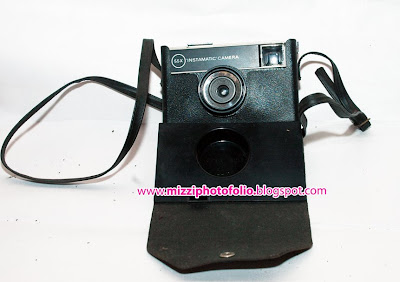The Kodak Instamatic 56-X was a viewfinder camera for 126 (Kodapak) film cartridges. It was part of the Instamatic range from September 1972 until 1977.
Specifications
Type: viewfinder camera
Manufacturer: Kodak AG (Germany) and Kodak Ltd. (UK)
Year of launch: 1972
Film: type No. 126 cartridge for 28×28mm exposures
Lens: 1:11/43mm, fixed focus
Shutter: single speed 1/50 sec.
Viewfinder: optical
Flash: Magicubes
 Canon Canonet
Canon CanonetManufacturer: Canon
Date of Production: 1961
Type of Camera: Rangefinder camera
Film/Sensor Type: 35mm
Lens: Canon Lens SE 45mm 1:1.9
Shutter: Copal SLV
Exposure Metering: Electronic Eye (Around lens)
Exposure Modes: Manual, Shutter Priority
Viewfinder: Rangefinder with parallax correction
ASA/ISO range: Manual: 10-400 ASA (DIN also indicated)
Battery: Not Required
Upside down of dial shutter
The Canon Canonet was released in 1961 and is remembered as Canon's first entry into the intermediate-class camera market, and also the first of the highly successful Canonet series of 35mm automatic-exposure rangefinder cameras.
The top plate only houses the shutter-release, with a locking ring for time-exposures, the frame counter and an accessory shoe.

The clean lines of the top are achieved by putting the advance lever underneath, together with the rewind crank, rewind release and back catch. The advance lever had an end which hinged downwards, making it easy to operate using the left middle- or third-finger. These controls on the bottom necessitate corresponding holes in the every-ready case.
Rangefinder focusing is controlled by a lever attached to the focus ring, also at the bottom of the camera.
CANON CAMERA CO. INC.
MADE IN JAPAN
The selenium meter cell is arranged around the Canon SE 45mm f1.9 lens - thus automatically compensating for filters; the aperture ring is scaled from f16 down to f1.9, followed by an "auto" setting (with a latch), for shutter priority automation. The Copal SV shutter has speeds from 1/500 down to 1sec, plus B. Film speed is set between 10-400 ASA by a lever in the shutter speed ring.- The viewfinder features a bright-line, and a scale showing the aperture.
- There is a PC socket beside the lens, and a switch on the lens barrel for X- or M-flash sync.
- There is a self-timer - set by a lever on the lens barrel.
- The Canonet was also sold by Bell & Howell as the Bell & Howell / Canon Canonet 19.

Mark: Fex Indo
Model: Central Viva 126 1000
Country of manufacture: France
Beginning of manufacture: 1972
Film format: 126
The range of Viva 126 comprises several models: 126,126 black, 1000,2000,3000,5000, S, Scotch tape etc. All these models have the same features, only the presentation changes.

The 126 1000 take again the presentation of the 126. The only difference is thus the existence of serigraphy “Viva 126 1000”. There exist two alternatives of the 1000 which are characterized by the position from serigraphy. On the first, it is on a pane located at the top of the objective. Over the second, the “Viva 126” is engraved on a black bottom, above the objective and a “Indo” 1000 is on false-wood, on the left of the objective. These differences are accompanied by a difference in color of the pictograms of Sun choice/Flash.


The Anny 35 was an inexpensive Japanese camera that took 135 film. It was made by Hōei (transliterated as Houay on the camera) during the 1960s. It featured a single element 50mm f8 fixed focus lens, 1 shutter speed and a selection of f stops.
The octagonal body shape, winding knob and lens barrel bear some resemblance to Hōei's Anny 44 127 film camera.
 There was also an unrelated Diana camera named Anny.
There was also an unrelated Diana camera named Anny.

Unique o'pening' cover
The Vredeborch Felica is a plastic camera, like an average box camera with aperture settings "sunny", "cloudy" and yellow filter, but with distance scale.
Specifications
Type: viewfinder camera
Manufacturer: Vredeborch
Year of launch: 1954 or 1955
Film: type 120 film rolls
Lens: 60mm
Shutter: guillotine-type, flash synchronized, with speeds 1/25 sec., 1/50 sec. and B
Aperture: f8 or f16
Viewfinder: optical, Albada type
Format: 6x6 cm negative

 Type 120 film rolls
Type 120 film rolls


Bidai (shutter) terletak di bahagian hadapan kamera. Antara keluaran terawal Kodak, mungkin kurang mesra pengguna.

Bahagian dalam kosong, menggunakan filem format 127mm. Filem ini asalnya direka untuk menyimpan 8 keping gambar dalam format 4x6.5 cm yang dihasilkan oleh Kodak. Filem ini juga dikenali sebagai filem Vest Pocket atau VP.
Selepas tahun 1960, penjualan filem 127mm mengalami kemerosotan. Kodak telah memberhentikan pengeluarannya pada tahun 1995. Satu-satunya kilang yang masih mengeluarkan filem ini terletak di Efke,Croatia, ianya masih dijual secara online.
















